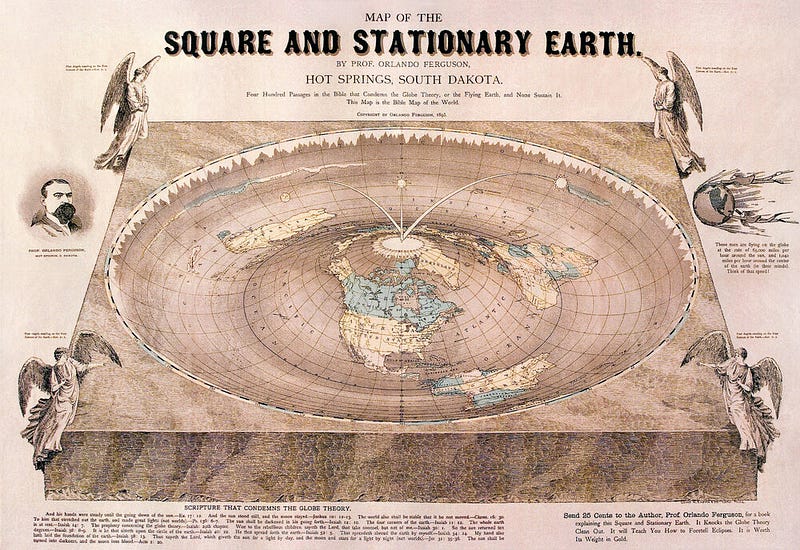Unraveling the Flat Earth Belief: A Deep Dive into History
Written on
Throughout history, humanity has grappled with the nature of our planet, leading to the rise of various theories regarding its shape. The flat earth concept, once dismissed by mainstream science, has recently gained traction, prompting curiosity and debate.

The notion of a flat earth is often ridiculed; however, its proponents are serious, and their beliefs warrant examination. The irony lies in the fact that despite numerous photographs and videos confirming the spherical shape of our planet, many individuals struggle to effectively counter the flat earth arguments.
It is disheartening that advocates of the flat earth theory often disregard photographic evidence, complicating discussions and arguments against their claims. This phenomenon reflects a broader issue of anti-intellectualism that has been pervasive throughout history. The difficulties in understanding both sides of such debates can lend undue power to fringe theories. It is crucial that we strive for intellectual honesty in these discussions, distancing ourselves from ignorance.
There’s also a commercial aspect to these beliefs. The mantra "everything you know is a lie" has proven lucrative for some, leading to a profitable industry surrounding the flat earth movement. One can't help but feel a twinge of envy towards those who capitalize on such ideas, even as they navigate their own moral dilemmas.
Flat earth theories may seem nonsensical to many, yet they exhibit a troubling blend of intelligence and potential deceit, especially if their proponents knowingly spread misinformation for profit. The question arises: are these individuals genuinely convinced of their beliefs, or are they simply perpetuating a modern form of trolling?
We are often quick to label others as foolish, but a more accurate depiction might be that they are "specialized." For instance, a carpenter may excel in his craft but struggle with complex sociopolitical theories. Just as one cannot judge an elephant's capabilities by its tree-climbing skills, we should appreciate the varied expertise across different fields.
To unravel the flat earth narrative, we can turn to ancient civilizations. The Greeks, during their golden age, began to develop the idea of a spherical earth long before modern explorations. Interestingly, early Mesopotamians depicted the earth as flat and encased in a dome, a concept that predates Eratosthenes' calculations of the earth's circumference around 240 BC.
Pythagoras was among the first to propose a round earth, driven by an aesthetic appreciation for the sphere, rather than empirical evidence. Aristotle further contributed to the debate with observations that hinted at a spherical planet, such as the way ships disappear hull-first over the horizon and the round shadow cast during lunar eclipses.
Eratosthenes, the chief librarian of Alexandria, famously calculated the earth's circumference by measuring the angle of shadows cast in different locations. This ingenious method combined geometry with physical observations, ultimately yielding an estimate remarkably close to modern measurements.

However, the spread of knowledge was not linear. Many ancient ideas were lost or intermingled with Roman learning, leading to periods of ignorance, such as the so-called "dark ages." The Renaissance revived these notions, paving the way for the Enlightenment and the scientific revolution.
Today, the internet serves as a double-edged sword, amplifying both knowledge and misinformation. The resurgence of flat earth beliefs is emblematic of this trend, attracting attention from celebrities and influencers alike. For instance, rapper B.O.B. famously clashed with astrophysicist Neil deGrasse Tyson over the theory, illustrating how pop culture can fuel the spread of conspiratorial thinking.
Despite attempts to discredit flat earth theories, the movement persists, often fueled by a blend of skepticism toward established science and a desire for community. Individuals like Samuel Shenton, who founded the Flat Earth Society, played a significant role in popularizing these ideas, especially during tumultuous times like the Cold War.
As we reflect on the implications of these beliefs, it's vital to recognize that the pursuit of knowledge is an ongoing journey. While some cling to outdated ideas, others strive for understanding through reason and inquiry.
Ultimately, whether these beliefs stem from genuine ignorance or a more calculated deceit, they highlight the importance of critical thinking and the need for robust, evidence-based discussions about our world.